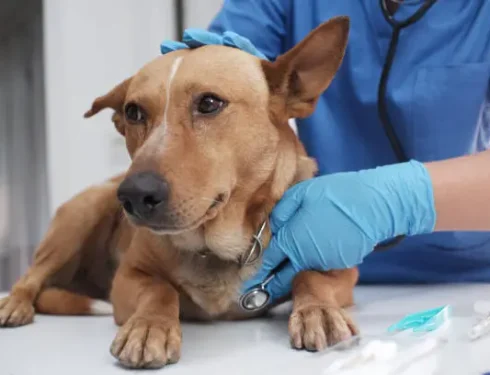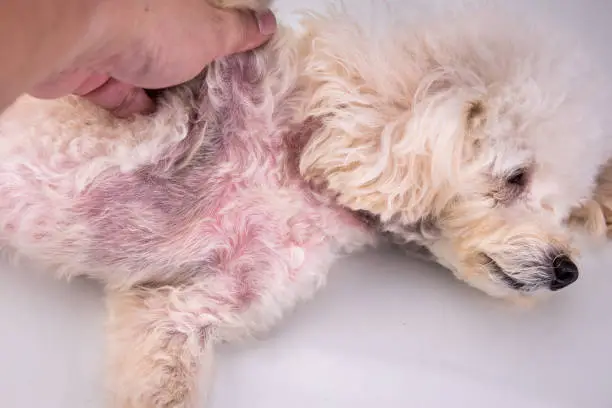Dog Panting at Night
Dogs pant regularly to regulate their body temperature, especially after exercise or on hot days. According to the American Kennel Club (AKC), panting is a primary mechanism for dogs to cool down. However, if your dog is panting excessively at night without any clear reason, it could indicate an underlying health issue. In this guide, we’ll explore the causes of nighttime panting, symptoms to watch for, and when it’s time to visit the vet.
Is It Normal for a Dog to Pant at Night?
Panting is a normal process for dogs, much like sweating in humans. However, excessive panting at night—when your dog is resting in a cool environment—may signal a health concern. This is particularly true if your dog is also restless, pacing, or displaying signs of distress.
Common Reasons Why Dogs Pant Too Much at Night
Several factors can contribute to nighttime panting. Here are a few of the most typical explanations:
1. Heatstroke or Overheating
Heatstroke occurs when a dog’s body temperature rises above 106°F (41°C). This can happen due to warm weather, inadequate ventilation, or exercise in hot conditions. Dogs rely on panting to cool down, but excessive heat can quickly lead to dehydration and organ damage.
Signs of Heatstroke in Dogs:
- Heavy panting and drooling
- Red or pale gums
- Rapid heart rate
- Weakness or collapse
What to Do: Move your dog to a cool area, offer water, and seek emergency veterinary care immediately.
2. Heart Disease and Respiratory Issues
Panting combined with coughing, lethargy, or difficulty breathing may indicate heart disease or heart failure. These conditions make it harder for oxygen to circulate through the body, causing dogs to pant excessively, even when at rest.
Dogs’ Heart Disease Symptoms:
- Panting after minimal activity
- Persistent coughing
- Fatigue and weakness
- Loss of appetite
What to Do: If your dog shows these symptoms, schedule a vet appointment as soon as possible.
3. Cushing’s Disease (Hyperadrenocorticism)
Cushing’s disease occurs when the body produces too much cortisol, leading to various symptoms, including excessive panting at night. The American Veterinary Medical Association (AVMA) notes that this condition is more common in older dogs and can be managed with proper medical treatment. It is most common in older dogs.
Signs of Cushing’s Disease:
- Increased thirst and urination
- Excessive hunger
- Hair loss
- Pot-bellied appearance
What to Do: A vet can diagnose Cushing’s disease with blood tests and imaging. Treatment typically involves medication or surgery.
4. Anxiety and Stress
Just like humans, dogs experience stress and anxiety, which can lead to nighttime panting and restlessness. Common triggers include:
- Separation anxiety (when left alone at night)
- Loud noises (fireworks, thunderstorms)
- Changes in environment (new home, new pet, or guest)
Signs of Anxiety in Dogs:
- Pacing or circling
- Whining or barking
- Shaking or hiding
What to Do: Provide a calm, safe environment with a quiet sleeping area. You can also use anxiety-reducing products like pheromone diffusers or consult your vet about anxiety medications.
5. Pain or Discomfort
Dogs experiencing pain from conditions like arthritis, injuries, or allergies may pant excessively at night. Since dogs are skilled at hiding pain, panting may be one of the first noticeable signs.
Signs of Pain in Dogs:
- Limping or difficulty standing
- Fear of jumping or climbing stairs
- Restlessness or aggression
What to Do: If you suspect pain, consult your veterinarian. Treatments may include pain relievers, anti-inflammatory medications, or lifestyle modifications.
6. Canine Cognitive Dysfunction (Dog Dementia)
Senior dogs may suffer from Canine Cognitive Dysfunction (CCD), a condition similar to Alzheimer’s in humans. CCD can cause confusion, disrupted sleep cycles, and increased panting at night.
Signs of Canine Dementia:
- Disorientation (e.g., staring at walls, getting stuck in corners)
- Increased anxiety or whining
- Forgetting house training
What to Do: While there is no cure, your vet may recommend diet changes, supplements, or medications to help manage symptoms.
When Should You See a Vet?
If your dog is panting at night frequently, it’s important to determine the cause. Veterinarians typically diagnose excessive panting by performing a physical examination, blood tests, and imaging to rule out underlying conditions. Seek veterinary attention if:
- Panting is sudden and severe
- Your dog struggles to breathe
- There are signs of pain, anxiety, or confusion
- Your dog has a persistent cough or lethargy
- You notice symptoms of heatstroke
Your vet will perform a physical exam and may conduct tests like blood work, X-rays, or ultrasounds to determine the underlying issue.
Preventing Nighttime Panting in Dogs
While some causes of panting require medical treatment, you can take steps to prevent discomfort:
- Keep Your Home Cool – Ensure proper ventilation and hydration, especially in warm weather.
- Manage Anxiety – Use calming aids and establish a bedtime routine.
- Regular Vet Checkups – Early detection of heart disease or Cushing’s disease can improve outcomes.
- Pain Management – If your dog has arthritis, consult your vet for appropriate pain relief options.
Final Thoughts
While panting is a natural behavior for dogs, excessive nighttime panting should not be ignored. Here are key takeaways to remember:
- Panting can be normal, but excessive panting at night may indicate a health issue.
- Common causes include heatstroke, heart disease, Cushing’s disease, anxiety, pain, or cognitive dysfunction.
- Seek veterinary care if panting is persistent, sudden, or accompanied by other symptoms. Whether caused by heat, anxiety, pain, or a medical condition, understanding the symptoms and knowing when to seek veterinary care is essential for your dog’s well-being. If your dog is restless and panting at night, consult a vet to ensure they stay comfortable and healthy.
Frequently Asked Questions
1. Why is my dog panting so much at night but not during the day?
Possible causes include anxiety, heatstroke, pain, heart disease, or cognitive dysfunction.
2. What should I do if my dog won’t stop panting at night?
Check for signs of distress, provide water, cool the environment, and consult a vet if symptoms persist.
3. Can stress cause a dog to pant at night?
Yes, anxiety from separation, loud noises, or environmental changes can lead to excessive nighttime panting.
4. How do I calm my dog down at night?
Establish a routine, provide a comfortable sleeping space, and consider using calming aids.



